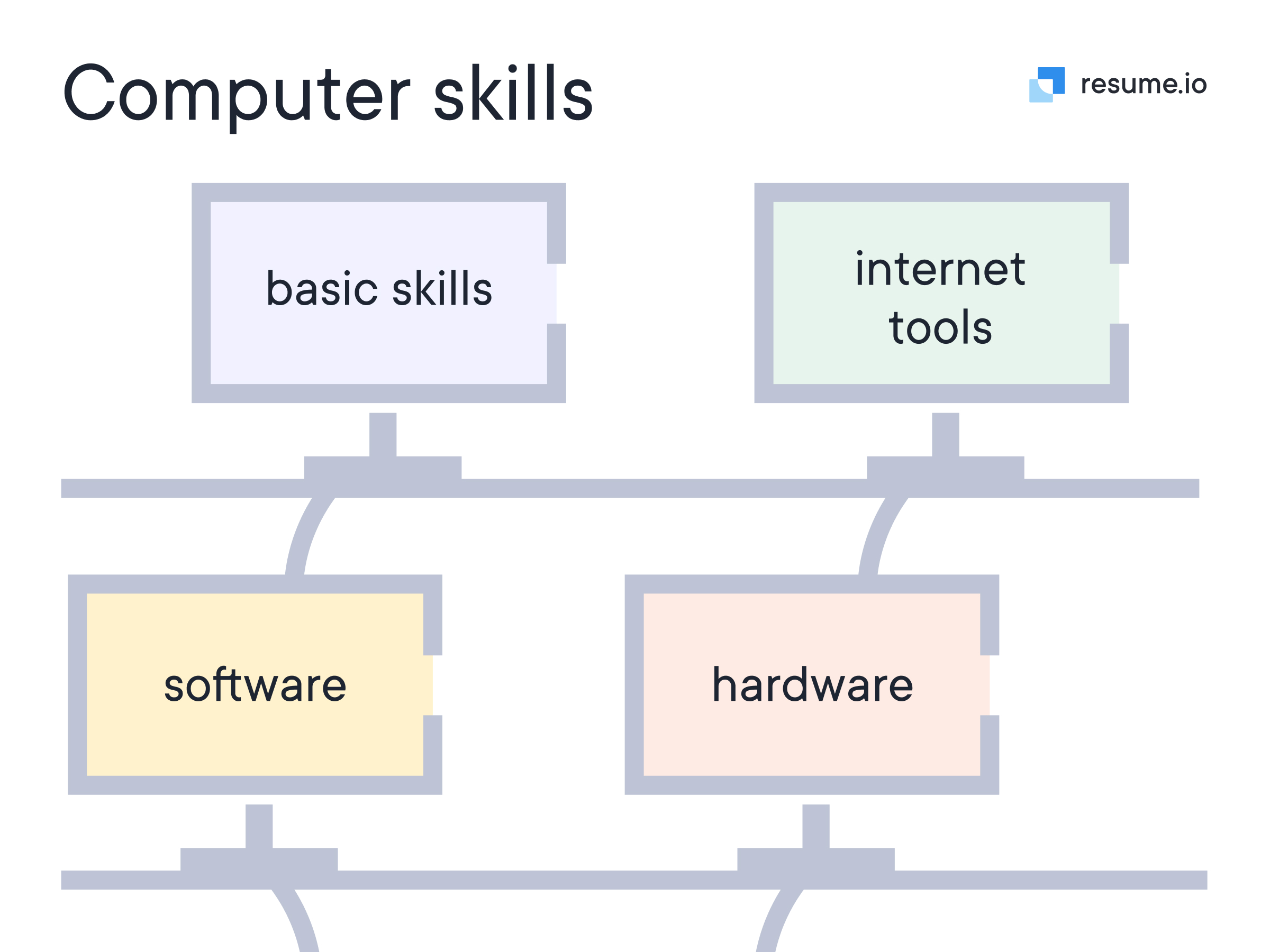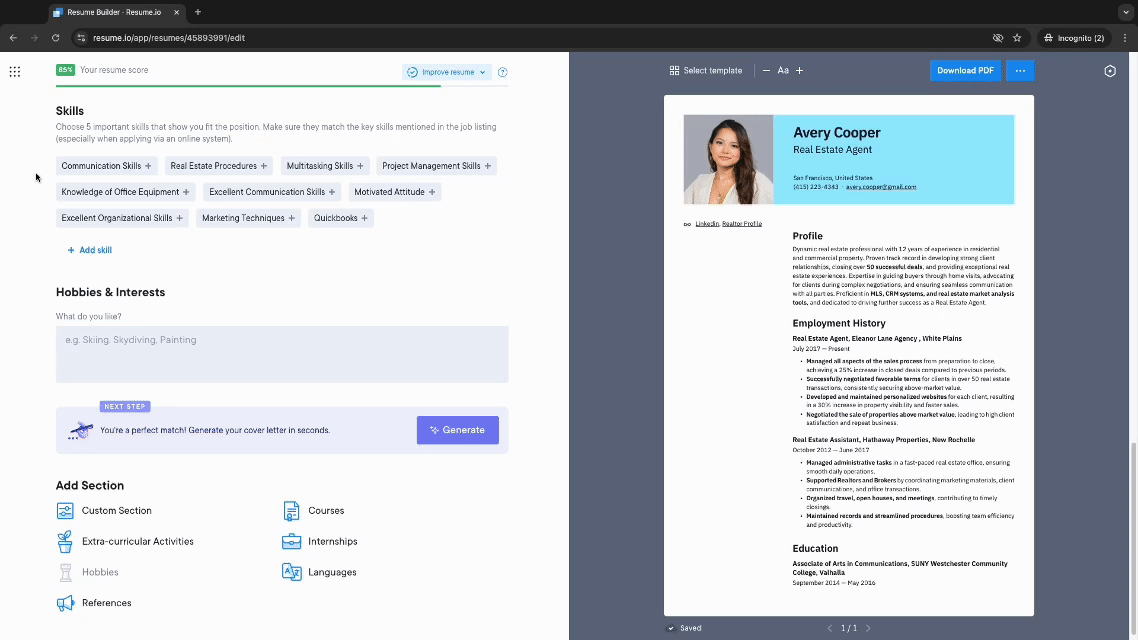Unless you are a programmer or tech professional, computer skills are likely not high on the list of things that you would wish to showcase on a job application. Surely you have more exciting things to put on your CV than your knowledge of an obscure piece of software?
You may be wrong. Learning and utilising rare tech skills is increasingly important for many careers, even if the computer skill is not directly relevant to a specific role. Are you the type to go home and develop these skills in your spare time? Why wouldn’t you mention this extracurricular passion in your CV? You never know — the hiring manager might be a technology aficionado.
As always, there should be a balance with the sort of information that you share on a CV. Computer skills will remain a facilitating factor in any achievement, so they should never take top billing. It is what you do with the skills that matter most. Here are a few things that we will consider when including computer skills on your CV:
- What are computer skills?
- How to effectively list computer skills on your CV
- 100+ computer skills
- Where to list computer skills on your CV.
Everyone possesses some degree of technological skill. I would suggest that they are present in a CV in some capacity. What can you say to a future employer about your computer skills? What difference will they make to your future performance?

What are computer skills?
With the proliferation of modern devices and wearable tech, it seems that “computer skills” is a somewhat old-fashioned phrase these days. Let’s assume that we are looking at any kind of skill that uses technology to improve performance in the workplace.
In today’s digitised world, familiarity with a range of hardware and software can ease navigation through all manner of professional situations. Furthermore, many careers require specialised skills that can only be enhanced on the job. Technology is often so intricately linked to performance that someone who is lacking in computer skills will automatically be at a disadvantage. That is why they are so important to include on any CV.
One benefit of a tech-led mindset is that it promotes critical thinking, problem-solving and adaptability. If you can show how your computer skills help you to solve real-world problems, your future employer will see you as someone who is creative about finding solutions. If computer skills are harnessed in the right ways, they can be a superpower.
How to list computer skills on your CV
Many of your tech-related skills are hard skills that likely took a while to learn, let alone achieve proficiency. While you might not work directly in a technology-based role, these skills may help improve your work impact in all sorts of ways.
The skills section of a CV is there to highlight these unique hard skills that may not be so obvious when hidden in the description of an accomplishment in the work experience section. Only include the rarest tech skills for your role, however. Not many employers will be impressed by a mastery of MS Office, but coding prowess may open doors for you.

Let your future employer know your level of proficiency where possible.
Here are some of the top computer skills that various professionals may include on their CV – depending on their seniority and function.
100+ computer skills
Basic computer skills
MS Office: Word, Excel, Outlook, Powerpoint, Access
Google Drive: Docs, Drive, Forms, Gmail, Sheets
Spreadsheets: Excel, Google Drive, Open Office, pivot tables, vertical lookups, macros
Email: Outlook, Gmail, mail merge, filters, folders
Presentations: PowerPoint, Google slides, Tableau, Keynote
Operating systems: MacOS, Microsoft Windows,
Internet tools
Social media: LinkedIn, Facebook, Twitter, Instagram, YouTube, Hootsuite, Tiktok, Pinterest
Content creation: CSS, Wordpress, SEO, content management, MailChimp, Google Analytics
Team collaboration: Dropbox, Slack, Zoom, Skype, Trello, Asana
Software skills
Programming/coding: Java, Javascript, Python, Ruby on Rails, Perl, PHP, XML, C#, C++, HTML
Data science and analysis: Apache, MySQL, SAS, JSON, machine learning, data mining, SQLite, RapidMiner, machine learning, open source
Database management: MS Access, Oracle, Teradata, MySQL, SQL, IBM DB2, SAP BI
Enterprise systems: BCP, CRM, E-commerce, HR management, ERP, Quikbooks, FreshBooks, Xero, Business intelligence
Graphics and design: Dreamweaver, Illustrator, InDesign, Lightroom, Photoshop, Acrobat, Corel Draw, AutoCAD, Microsoft Publisher
Hardware Skills
Maintenance: Hardware configuration, system administration, tech support, software installation, Linux/Unix
Networking: Network configuration, security, network automation, cloud management, WAN/LAN, DNS, DHCP, debugging
Finding efficiencies with technology is something that will supercharge the productivity of most employees over the coming years.
Where to share computer skills on your CV
There are certain places in a CV where an employer would expect to find your computer skills. While they might not be the most exciting component of most job applications, technology skills are central to success in many professions. Do not leave them out.
CV summary
The summary section of a CV is the perfect place to mention a couple of critical computer skills if they are central to your career. This is particularly important in technology positions where such abilities can truly make a difference in performance.
For roles that are less reliant on technology skills, this approach may be a waste of precious CV space. Instead, focus on the behaviours that led to your most relevant accomplishments. When computer skills are expected in the role, a certain level of proficiency will be assumed.
Work experience section
The work experience section of a CV is where you frame your accomplishments with descriptive action verbs while outlining the key skills that helped you to achieve astounding outcomes. If computer skills played a significant part in the achievement, they could feature here, but only if they truly moved the needle in terms of your performance.
Reiterating skills across various sections of your CV holds a certain strength, so don't hesitate to emphasise computer skills that you are passionate about and that allow you to make a distinct impact. This repetition reinforces their importance and demonstrates your commitment to these skills, showcasing your unique abilities.
Skills section
The sidebar of a CV may offer plenty of space for hard skills, but that does not mean that you need to fill it. White space is important in a CV, so only pick the top hard skills that will set you apart from your competition.
Prioritise the most important skills first and group your computer skills together. This will help a hiring manager appreciate the breadth of your experience, and you can ensure that you are only including skills that will be useful for each role. Try to include other skills that are complementary to computer skills, such as agile/lean management. Technology skills only make a difference if they are implemented correctly.
Should you explain the proficiency of computer skills?
There will inevitably be different proficiency levels in your computer skills, so it is worth considering how to display it on a CV.
One option is to create some sort of graphical representation in the skills section, but that will always be a subjective measure and will depend on seniority. There is also a danger when you rate your skill levels – anything below top marks can raise unnecessary questions. You might want to skip this step and keep things simple.
The simple solution is to let the level of your accomplishments do the talking. Your hiring manager will know what level of tech proficiency is involved in any given job or project, so trust their judgement and don’t take the time to explain what is likely obvious to them.
Key takeaways
- In the modern workplace, computer skills have become essential for efficiently carrying out many job roles.
- Certain basic computer skills are considered common knowledge, so it is unnecessary to use valuable space on your CV listing skills like "Microsoft Word."
- For technology-focused positions, it is crucial to showcase your advanced computer skills, and it is advisable to prioritise the ones that are most relevant to the employer's requirements.
- You have multiple options When you include computer skills in your CV. Consider adding any essential skills to the summary or employment history sections in addition to the dedicated skills section.




